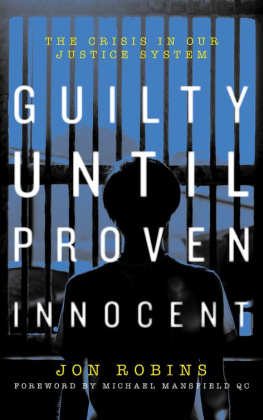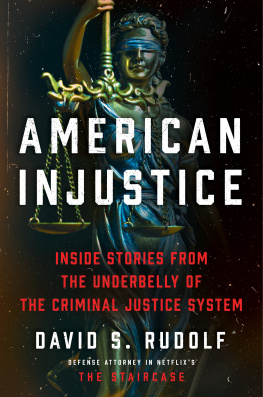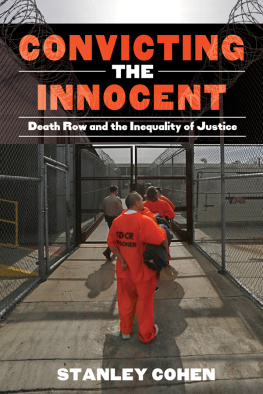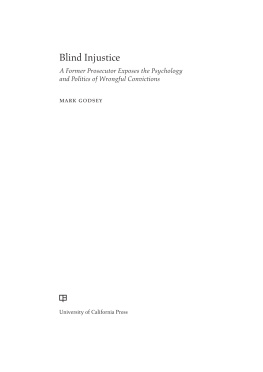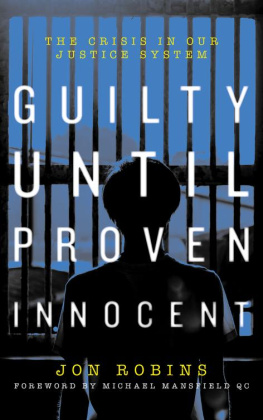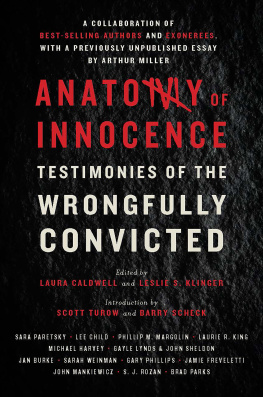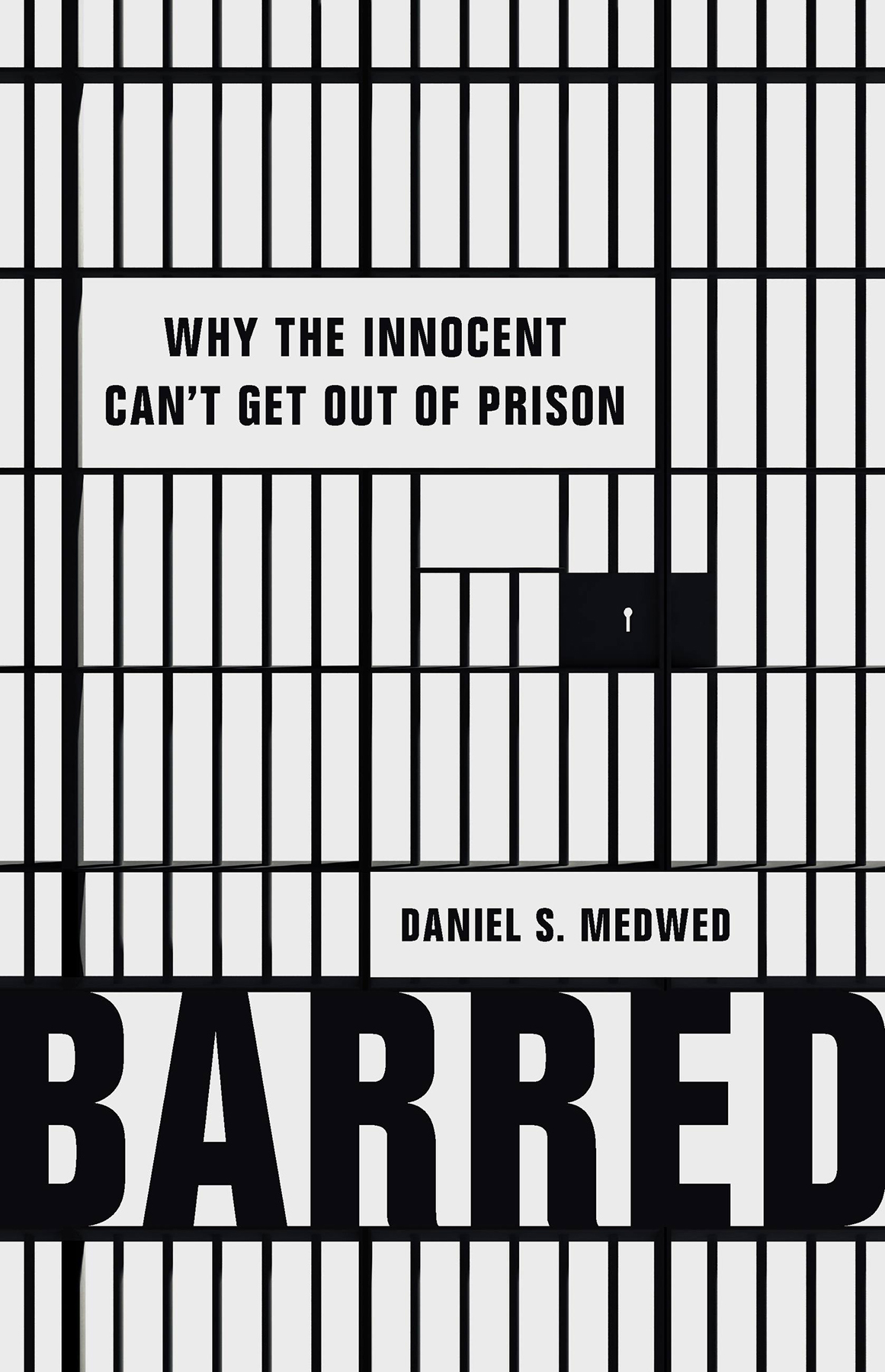Praise for
BARRED
For every newspaper photo of an innocent person exiting the prison gates, clutching the hand of their triumphant lawyer, there are uncountable others whom we will never allow to see that daywho will die in prison because our laws make it so difficult to prove their innocence in court. In Barred , Daniel S. Medwed gives us an urgent tour of the darkest corners of our judicial system, where persuasive evidence becomes trapped in a labyrinth of legal procedure. Underlying Medweds sharp legal analysis is a political question: Is this the country we want to be?
Maurice Chammah, author of Let the Lord Sort Them
With this insightful book, Medwed exposes the byzantine tangle of legal rules and procedures that keep innocent people in prison. Clear, accessible, and often astounding, Barred explains why strong evidence of innocence doesnt matter once a trial is over, and how our criminal system routinely sacrifices accuracy for finality. A leading scholar and expert on innocence, Medwed is also a wonderful educator. This book teaches us all how the wrongfully convicted are trapped by the criminal bureaucracy, by modern appellate rules, and by ancient Latin writs that have been around for hundreds of years.
Alexandra Natapoff, author of Punishment Without Crime
Most people are by now aware that the criminal justice system, being made up of human beings, makes mistakes. Much has been written about one such mistake: that a scandalously large number of innocent people get convicted and sent to prison. What many people remain largely unaware of is that it is far easier for the government to convict an innocent person than it is for that innocent person to get out of prison. With Barred , we finally have a lucid explanation of how exactly this infuriating feature of our system persists. Medwed is one of the nations leading scholars on wrongful convictions and one of the nations leading lawyers at helping free innocent inmates. In this groundbreaking book, Medwed brings his expertise as both a scholar and a practitioner to illuminate how something that makes no sense happens routinely. Anyone interested in understanding the magnitude of the chasm between true justice and our actual criminal justice system, and in learning how we as a society might shrink it, should read this book.
David Dow, author of The Autobiography of an Execution
Copyright 2022 by Daniel S. Medwed
Cover design by Chin-Yee Lai
Cover image SSSCCC / Shutterstock.com
Cover copyright 2022 by Hachette Book Group, Inc.
Hachette Book Group supports the right to free expression and the value of copyright. The purpose of copyright is to encourage writers and artists to produce the creative works that enrich our culture.
The scanning, uploading, and distribution of this book without permission is a theft of the authors intellectual property. If you would like permission to use material from the book (other than for review purposes), please contact permissions@hbgusa.com. Thank you for your support of the authors rights.
Basic Books
Hachette Book Group
1290 Avenue of the Americas, New York, NY 10104
www.basicbooks.com
First Edition: September 2022
Published by Basic Books, an imprint of Perseus Books, LLC, a subsidiary of Hachette Book Group, Inc. The Basic Books name and logo is a trademark of the Hachette Book Group.
The Hachette Speakers Bureau provides a wide range of authors for speaking events. To find out more, go to www.hachettespeakersbureau.com or call (866) 376-6591.
The publisher is not responsible for websites (or their content) that are not owned by the publisher.
Library of Congress Cataloging-in-Publication Data
Names: Medwed, Daniel S., author.
Title: Barred: why the innocent cant get out of prison / Daniel S. Medwed.
Description: New York, NY: Basic Books, 2022. | Includes bibliographical references and index.
Identifiers: LCCN 2022017368 | ISBN 9781541675919 (hardcover) | ISBN 9781541675902 (ebook)
Subjects: LCSH: Judicial errorUnited States. | False imprisonmentLaw and legislationUnited States. | Writ of error coram nobisUnited States. | Presumption of innocenceUnited States. | Plea bargainingUnited States. | Habeas corpusUnited States. | Criminal justice, Administration ofUnited StatesCriminal provisions.
Classification: LCC KF9756 .M43 2022 | DDC 345.73/0122dc23/eng/20220630
LC record available at https://lccn.loc.gov/2022017368
ISBNs: 9781541675919 (hardcover), 9781541675902 (ebook)
E3-20220711-JV-NF-ORI
For my brilliant wife, Sharissa Jones, whose sacrifices enabled me to pursue my professional dreams, and for our amazing children, Clementine and Mili, who will forever remain actually innocent in my eyes.
Bobby Fennell had spent sixteen years behind bars for a murder he didnt commit. We were scheduled to meet in person for the first time in the summer of 2001if I could locate the prison.
Id never been to Otisville. Its one of many dots on the map of prison towns that stretches from the New York City suburbs all the way to Canada. Otisville lacks the notoriety of other penitentiaries in the state, like Sing Sing (perched along the banks of the Hudson, and genesis of the phrase to be sent up the river) or Attica (home to the brutal riots of 1971). I considered the facilitys low-key reputation a good omen. The corrections officers were less likely to give me grief than at other spots. And I needed a calm interaction with the COs before telling my client the bad news that I felt morally obligated to deliver in person: that we wouldnt be able to prove his innocence in court.
After an accidental detour or two, I found the right place. I parked near the visitors entrance, rolled down my windows, and reviewed my notes.
Bobby Fennells 1985 murder conviction stemmed from the shooting of John Williams outside a base house in Manhattan, where people purchased and freebased cocaine. Fennell provided security for the drug operation, which made him a prime suspect. He maintained his innocence from the get-go, insisting he was with his girlfriend at the time of the murder.
The prosecutions case relied on the credibility of a single eyewitness, a man with a lengthy rap sheet and a drug addiction. The witness claimed Williams got into a fight at the base house, which prompted Fennell and another sentry, Joseph Perry, to drag Williams into the street and take turns shooting him. That was all the government had, a shaky witness recounting how two enforcers had gunned down a rowdy customer outside a drug den.
Undeterred by the minimal evidence at its disposal, the state filed murder charges against Fennell and Perry and prosecuted the defendants together in a joint trial. The government lawyer entrusted with litigating the case, an assistant district attorney in Manhattan, asked the eyewitness a series of friendly questions that elicited testimony implicating Fennell and Perry. But the threads holding the story together unraveled on cross-examination by the defense. First, the witness admitted hed received a sweetheart deal on his pending drug charges in exchange for testifying. Second, his responses at trial differed from his prior statements. There were discrepancies in the number of shots fired and the roles played by the two alleged perpetrators. The jury nevertheless bought his story.


